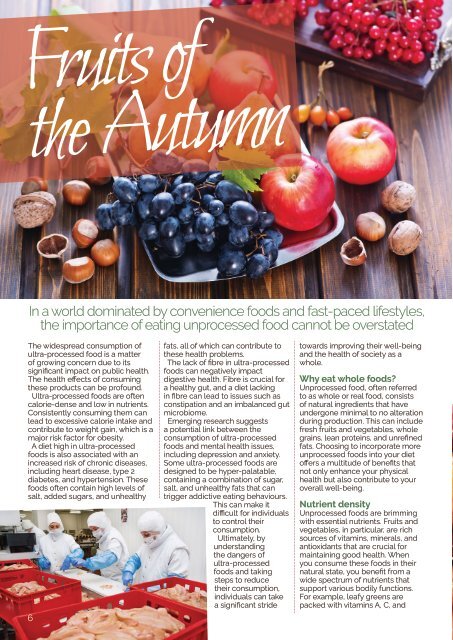Whitchurch and Llandaff Living Issue 68
Issue 68 of the award-winning Whitchurch and Llandaff Living magazine.
Issue 68 of the award-winning Whitchurch and Llandaff Living magazine.
Create successful ePaper yourself
Turn your PDF publications into a flip-book with our unique Google optimized e-Paper software.
Fruits of<br />
the Autumn<br />
In a world dominated by convenience foods <strong>and</strong> fast-paced lifestyles,<br />
the importance of eating unprocessed food cannot be overstated<br />
The widespread consumption of<br />
ultra-processed food is a matter<br />
of growing concern due to its<br />
significant impact on public health.<br />
The health effects of consuming<br />
these products can be profound.<br />
Ultra-processed foods are often<br />
calorie-dense <strong>and</strong> low in nutrients.<br />
Consistently consuming them can<br />
lead to excessive calorie intake <strong>and</strong><br />
contribute to weight gain, which is a<br />
major risk factor for obesity.<br />
A diet high in ultra-processed<br />
foods is also associated with an<br />
increased risk of chronic diseases,<br />
including heart disease, type 2<br />
diabetes, <strong>and</strong> hypertension. These<br />
foods often contain high levels of<br />
salt, added sugars, <strong>and</strong> unhealthy<br />
6<br />
fats, all of which can contribute to<br />
these health problems.<br />
The lack of fibre in ultra-processed<br />
foods can negatively impact<br />
digestive health. Fibre is crucial for<br />
a healthy gut, <strong>and</strong> a diet lacking<br />
in fibre can lead to issues such as<br />
constipation <strong>and</strong> an imbalanced gut<br />
microbiome.<br />
Emerging research suggests<br />
a potential link between the<br />
consumption of ultra-processed<br />
foods <strong>and</strong> mental health issues,<br />
including depression <strong>and</strong> anxiety.<br />
Some ultra-processed foods are<br />
designed to be hyper-palatable,<br />
containing a combination of sugar,<br />
salt, <strong>and</strong> unhealthy fats that can<br />
trigger addictive eating behaviours.<br />
This can make it<br />
difficult for individuals<br />
to control their<br />
consumption.<br />
Ultimately, by<br />
underst<strong>and</strong>ing<br />
the dangers of<br />
ultra-processed<br />
foods <strong>and</strong> taking<br />
steps to reduce<br />
their consumption,<br />
individuals can take<br />
a significant stride<br />
towards improving their well-being<br />
<strong>and</strong> the health of society as a<br />
whole.<br />
Why eat whole foods?<br />
Unprocessed food, often referred<br />
to as whole or real food, consists<br />
of natural ingredients that have<br />
undergone minimal to no alteration<br />
during production. This can include<br />
fresh fruits <strong>and</strong> vegetables, whole<br />
grains, lean proteins, <strong>and</strong> unrefined<br />
fats. Choosing to incorporate more<br />
unprocessed foods into your diet<br />
offers a multitude of benefits that<br />
not only enhance your physical<br />
health but also contribute to your<br />
overall well-being.<br />
Nutrient density<br />
Unprocessed foods are brimming<br />
with essential nutrients. Fruits <strong>and</strong><br />
vegetables, in particular, are rich<br />
sources of vitamins, minerals, <strong>and</strong><br />
antioxidants that are crucial for<br />
maintaining good health. When<br />
you consume these foods in their<br />
natural state, you benefit from a<br />
wide spectrum of nutrients that<br />
support various bodily functions.<br />
For example, leafy greens are<br />
packed with vitamins A, C, <strong>and</strong>

















